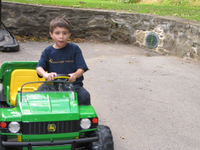In our house, we are both rabbis. We knew we would soon be called to minister to our colleague
and friend S, who had struggled for months to live fully despite her cancer.
The call came at 6 am: S had finally taken her last, labored breaths with her two grown
daughters by her bedside. One of
us attended to the bereaved on the phone while the other (me) distracted Buddy,
our 9 year-old son with autism. A
perpetual early riser, Buddy was already watching his treasured YouTube videos
of basketball players. He can
watch the same videos over and over. He seems just as excited to watch the same clips of the Lakers on this
morning as two weeks ago and two months ago For the millionth time, I find myself wishing for his
developmental progress. I yearn
for his mind to awaken to more than sports and trucks.
When Buddy heard the phone ring, he immediately began
peppering me with questions.
I’m not going to lie to him. Even if he doesn’t understand what is going on, he is going
to hear all the planning and be affected by his parents’ sudden absence over
the next few days.
“S died,” I told him, simply. I waited for his reaction.
“Where did she die?” he wanted to know.
“At home. In
her bed.”
“Why did she die?”
“She was very sick.
Her body wasn’t strong any more.
It was her time to go.”
“Is she sad?”
“No, honey, she is not sad. Her family is sad.
They miss her already. But
she is not sad.”
“Why isn’t she sad?”
“Because she isn’t in her body any more. She is going back to God.”
“Are you going
back to God?”
“Well, one day I will.” I thought this might make him afraid, so I added, “But not any time soon. I hope not until I’m really old.”
“Was S old?”
“No, she wasn’t old. Well, maybe you’ll think she was old. She was almost 60.”
“Sixteen?” he asked. I suppressed a smile, wondering if he thought 16 was old. Wondering if 16 was any different to him than 60. Wondering if he will ever learn to tell time to the minute, ever comprehend the meaning of the numbers on a clock.
“No, not sixteen. Sixty. But lots of people live way past that. She died too young.”
“Why did she die young?”
“Because her body was sick.”
“Where is her body now?”
“Still at the house. The funeral home directors are coming soon. They will take her body back to the funeral home so mommy and some other people can get it ready for burial.”
Apparently finished, he looks around the playroom.
“What should we play now?”
Well, that was that, I thought. Time to move on. “What do you want to play?”
“Trucks.”
No surprise there. Day in and day out, one of the features of autism is this frustrating repetitive play. For our son, only the tiniest of variations are allowed in the type of truck. I have spent countless hours pretending to move around gardening trucks, trash trucks, recycling trucks. Construction trucks, tree mulching trucks. I can only expect rebuff if I suggest trains, planes or automobiles.
I sighed, thinking it way too early in what was surely going to be a difficult day to be trapped in the same old truck stories.
“What kind of trucks?” I ask, summoning patience.
Thoughtfully, he replies, “This truck is for the funeral director. He is coming to take away the dead body.”
Not for the first time, my son takes my breath away.
Rabbi Margot Stein works with special needs kids and their families to create meaningful life cycle ceremonies. rabbimargot@booktobimah.com


